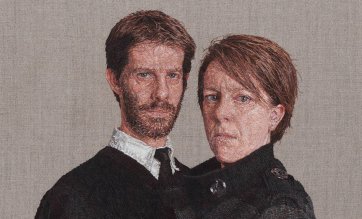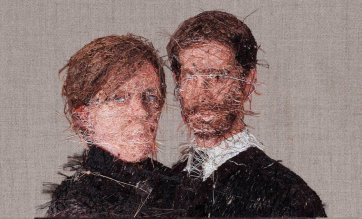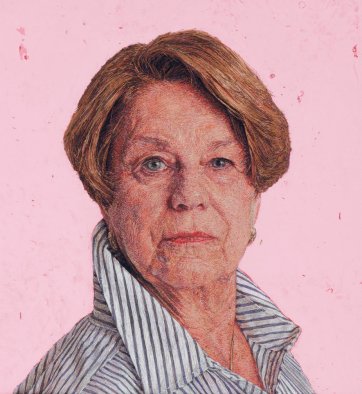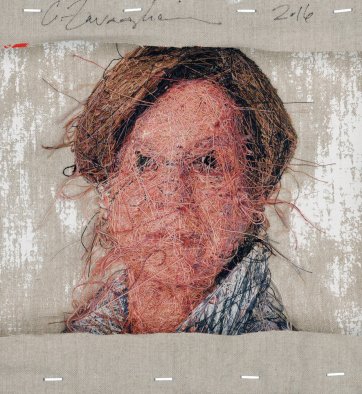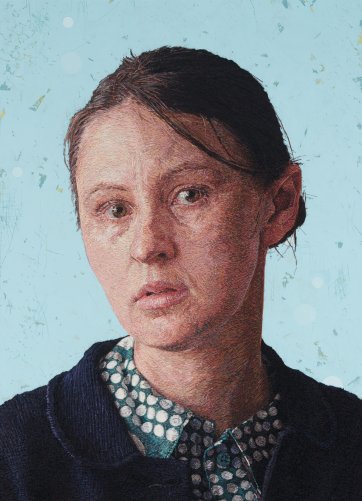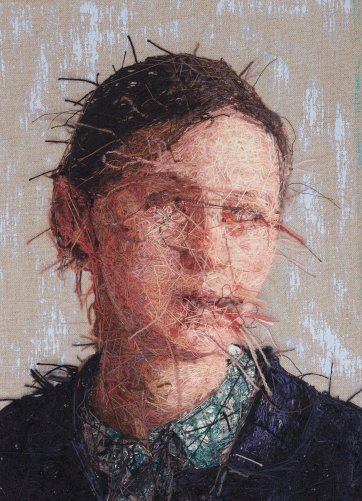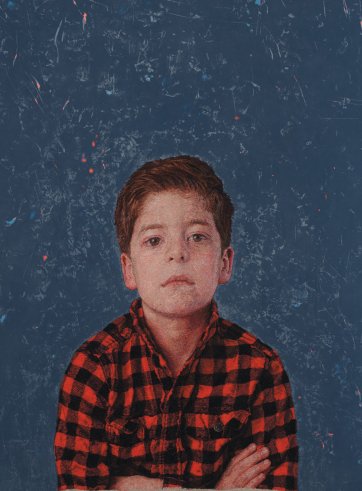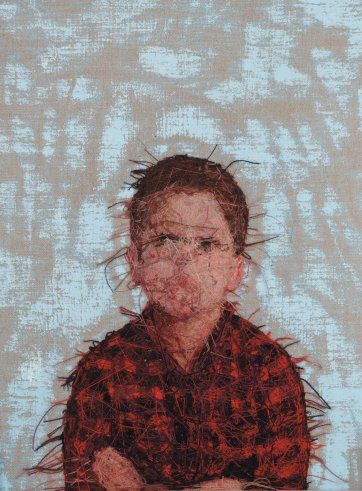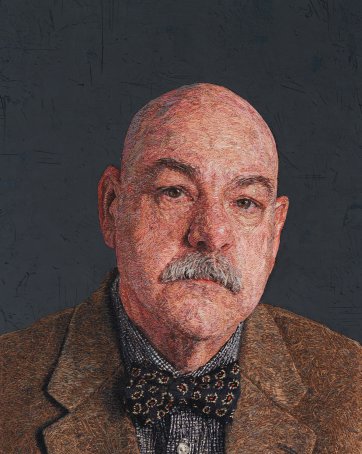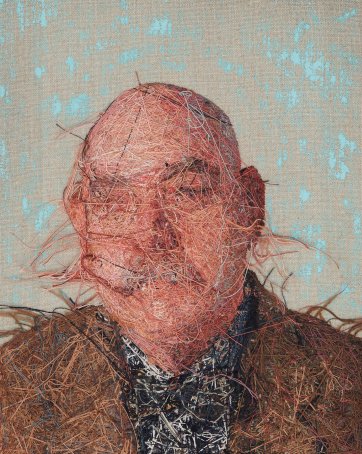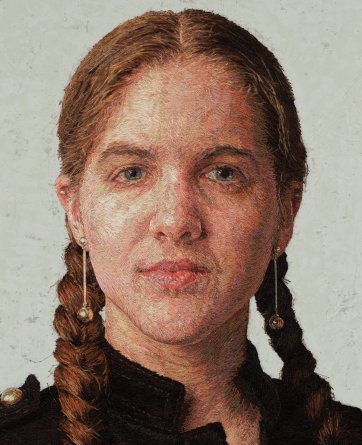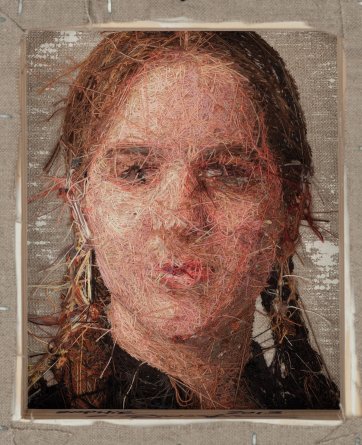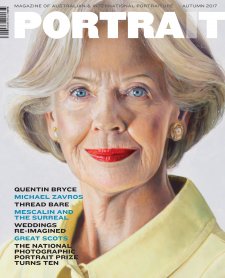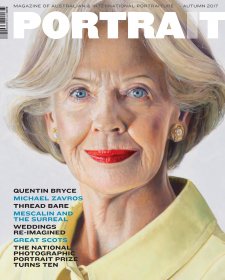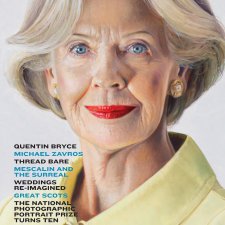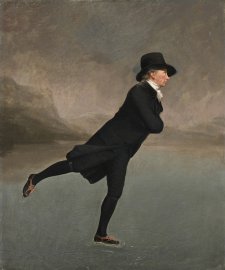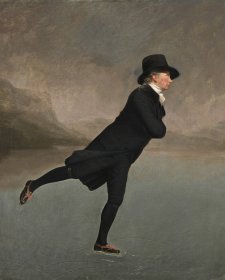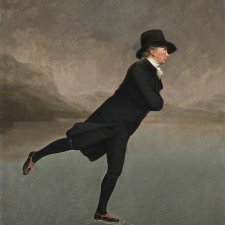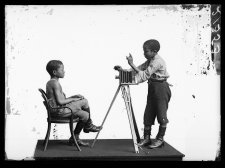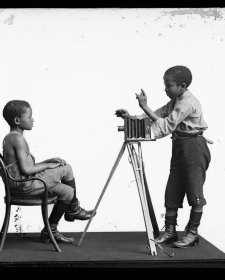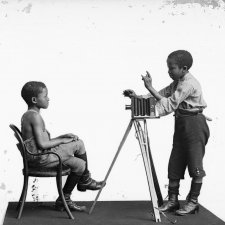It is often the case for an artist that the memory of a piece of work created as a child lodges itself in our consciousness, then resurfaces later in unexpected ways. For me, this ‘piece’ was a crewel embroidery kit I made as an American kid growing up in the suburbs of Sydney. The embroidery depicted a sheep station in the Australian landscape, complete with satin stitched gum trees and French knotted sheep. Using wool to create the illusion of real sheep wool seemed like medium magic! Although folded away in a box for years, the memory of the making of this piece stayed with me when I moved back to the United States as a teenager, and later as I went on to art school.
1 2 Greg and I 2012 Both by Cayce Zavaglia.
My painting has always focused exclusively on portraits of friends, family, and fellow artists. Over the years, however, the use of actual paint has gradually diminished in my work. During college, I produced works on canvas painted so thickly they often resembled cake frosting. While in graduate school, I transitioned into works on panel that employed thin layers of medium-laden oil paint.
1 2 Lorelai 2016 Both by Cayce Zavaglia.
It was the birth of my daughter sixteen years ago that prompted the almost complete removal of paint from my practice. With the drive to establish a non-toxic environment, I removed turpentine, varnish and oil paint from my studio, and replaced them with new materials with which I had little history. I gave myself a summer to experiment, but came up with nothing. Then, remembering the sheep station I made as a child, I decided to experiment with embroidered portraits.
1 2 Martina 2015 Both by Cayce Zavaglia.
I phoned my mum and asked her to mail the piece back to me, and borrowed as many embroidery books from the library as I could find. I spent several days trying to re-learn traditional embroidery stitches, but quickly found it was the medium I was interested in, rather than the traditional sewing techniques per se. Accordingly, I realised my approach would need to borrow from my own study of (and experience with) drawing and painting: the process would need to emerge and develop through experimentation with the material as I worked from portrait to portrait.
1 2 Luca Nicolo, age 7 2016 Both by Cayce Zavaglia.
At first, working with an established range of wool colours proved frustrating because I was unable to mix the palette by hand. However, with experimentation and practice, I developed and settled on a sewing technique that allowed me to blend colours and establish tonalities – one that resembled the techniques used in classical oil painting.
1 2 Uncle Stevie 2015 Both by Cayce Zavaglia.
My work is all hand-sewn, using cotton and silk thread or crewel embroidery wool. The use of paint is limited to the background. The direction in which the threads are sewn mimics the way brush marks are layered within a painting, which in turn allows for the illusion of depth, volume, and form. My stitching methodology borders on the obsessive, but ultimately allows me to evoke painterly renditions of flesh, hair, and cloth. From a distance the pieces read as hyper-realistic paintings; only after closer inspection does the work’s true construction reveal itself.
1 2 Sophie 2013 Both by Cayce Zavaglia.
A few years ago I turned one of my embroideries over, and, for the first time, saw the possibilities of a new image and path for my work. It had been with me in the studio all along, but had gone unnoticed – a lovely (if somewhat disturbing) abstract portrait that was blindly, incidentally created on the back of the piece during the construction of the meticulously sewn front image. The haphazard beauty in this verso image created a haunting psychological contrast to the front image. It was a world of loose ends, knots and chaos. Highlighting the reverse side of my embroideries, the part of a work historically and traditionally hidden from the viewer, has initiated a conversation about the divergence between our presented and private selves. I now produce gouache and acrylic paintings of these verso images as I continue to work on new recto embroidery.
For the last sixteen years, I have concentrated on embroidering portraits of loved ones in my life, but haven’t yet created the portraits of loved ones from my childhood in Australia. Two years ago I was given a generous grant by the Regional Arts Commission of St. Louis, Missouri to travel back to Australia to document childhood friends and their families for an upcoming body of work. As I spent several weeks travelling around Sydney and up into the Blue Mountains for the portrait sessions, I realised there was something distinctive about the Australian portrait that I hoped to capture in thread. An accent alone doesn’t make someone Australian – the country is reflected in the faces of its people. I know it when I see it and it feels like home. My exhibition of these Sydney portraits will debut at Lyons Wier Gallery NYC in the spring of 2018.
